MAECI
#INSIEMEPERGLISDG 2023
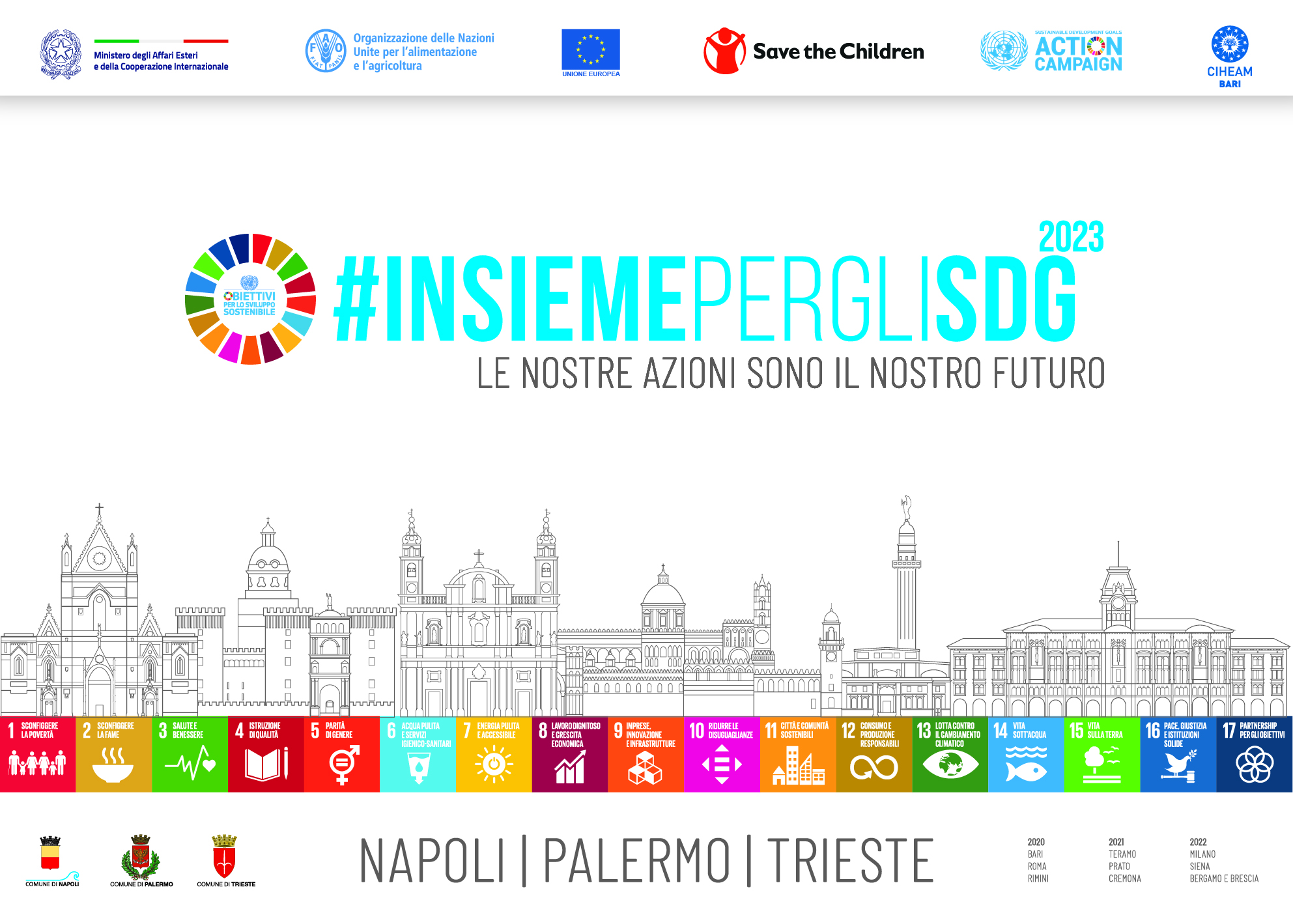
La campagna #InsiemepergliSDG promossa dal Ministero degli Affari Esteri e della Cooperazione Internazionale, insieme ai partner UN SDG Action Campaign, FAO, Commissione Europea, CIHEAM Iamb di Bari e Save the Children, per sensibilizzare l’opinione pubblica sugli Obiettivi di Sviluppo Sostenibile (gli SDG) e sul lavoro della Cooperazione Italiana e dei suoi partner per il raggiungimento di tali obiettivi nel mondo post – Covid19, quest’anno toccherà le città di Napoli, Trieste e Palermo, accendendo i riflettori sul ruolo delle Città portuali italiane quale finestra sul Mediterraneo.
Dal 24 al 27 maggio 2023, l’iniziativa #InsiemepergliSDG, in collaborazione con il Comune di Napoli e il Centro Agritech (Università Federico II) ha portato nella città di Napoli 3 eventi di alto livello e le installazioni interattive sull’Agenda2030 disposte all’interno del cortile del Maschio Angioino.
Per maggiori info visita https://www.comune.napoli.it/insiemeperglisdg Comune di Napoli – Conclusa l’iniziativa “Insieme per gli SDG”
#InsiemepergliSDG è stata avviata a Bari nell’ottobre 2020 e nel 2021 ha viaggiato per le città di Bari, Teramo, Roma, Prato e Cremona per sensibilizzare l’opinione pubblica sugli Obiettivi di Sviluppo Sostenibile (gli SDG) e sul lavoro della Cooperazione Italiana e dei suoi partner per il raggiungimento di tali obiettivi nel mondo post – Covid19.
Ciascuna tappa di #InsiemepergliSDG contribuisce a un percorso che crea legami e relazioni tra i partner promotori dell’iniziativa e le realtà locali con l’obiettivo di far emergere e valorizzare le migliori esperienze locali. L’iniziativa sostiene e sviluppa percorsi di condivisione attraverso formazione e didattica, politica partecipativa, cittadinanza attiva, gioco e creatività. Infine, l’iniziativa sviluppa partenariati con i media locali per promuovere i messaggi della campagna e partecipazione sul territorio.
Parte integrante della campagna #InsiemepergliSDG sono le installazioni itineranti per informare e responsabilizzare i visitatori sugli obiettivi di sviluppo sostenibile e sul ruolo che ogni individuo può svolgere per il loro raggiungimento e per mostrare, con esempi pratici, come la Cooperazione Italiana e i suoi numerosi partner internazionali, nazionali e locali, lavorano in Italia per contribuire al raggiungimento degli SDG, informando giovani, studenti, famiglie e cittadini sull’ impegno comune per lo sviluppo sostenibile.
Oltre alle installazioni, il format della campagna prevede numerose attività, che vengono definite insieme ai partner locali: ad esempio, consigli comunali straordinari che discutono del ruolo degli enti locali per raggiungere l’AGENDA2030; iniziative didattiche con il coinvolgimento di bambine, bambini, adolescenti e scuole, attraverso laboratori dedicati agli SDG e organizzati da Save the Children Italia; realizzazione di opere di street-art murales sugli obiettivi di sviluppo sostenibile, in partenariato con la UN SDG Action Campaign, per valorizzare il ruolo dell’arte come strumento per mobilitare, ispirare e connettere il grande pubblico sugli SDG, coinvolgendo artisti locali e avviando un percorso di rigenerazione urbana attraverso questa modalità di street-art; giornate dedicate allo sport come strumento di inclusione e dialogo.
Per maggiori info e galleria immagini di tutte le tappe di #InsiemepergliSDG realizzate finora clicca sulla finestra #InsiemepergliSDG 2021 e #InsiemepergliSDG 2022.
Guarda il promo #InsiemepergliSDG2023
FAO
Libro di attività - “L'aqua è vita, l'acqua ci nutre. Non lasiare nessuno indietro.”
Il tema della Giornata Mondiale dell’Alimentazione di quest’anno esamina i modi in cui questa preziosa risorsa naturale è importante per l’alimentazione e per l’ambiente. Le sfide globali, come la crescita demografica, il cambiamento climatico e l’aumento della produzione di beni e servizi, mettono a rischio le nostre reti idriche. Se intendiamo tutelare le riserve d’acqua, dobbiamo partire dall’agricoltura e dai sistemi alimentari nel loro complesso. È un utile strumento didattico per stimolare le giovani menti in vista del concorso poster

Libro in altre lingue
Arabo
Cinese
Francese
Inglese
Spagnolo
Russo
Libro di attività - Agiamo per il clima - La storia di Maria

Libro in altre lingue
Arabo
Cinese
Francese
Inglese
Spagnolo
Russo
Edizioni precedenti
Libro delle Attività - “Non lasciare nessuno indietro. Una produzione migliore, una nutrizione migliore, un ambiente migliore e una vita migliore.”

Libro in altre lingue
Arabo
Cinese
Francese
Inglese
Spagnolo
Russo
Libro di Attività - Le nostre azioni sono il nostro futuro. Una produzione migliore, una nutrizione migliore, un ambiente migliore e una vita migliore

Libro in altre lingue
Arabo
Cinese
Francese
Inglese
Spagnolo
Russo
Portoghese
Libro di attività - Eroi dell’alimentazione – Libro delle Attività sulla Giornata Mondiale dell’alimentazione 2020
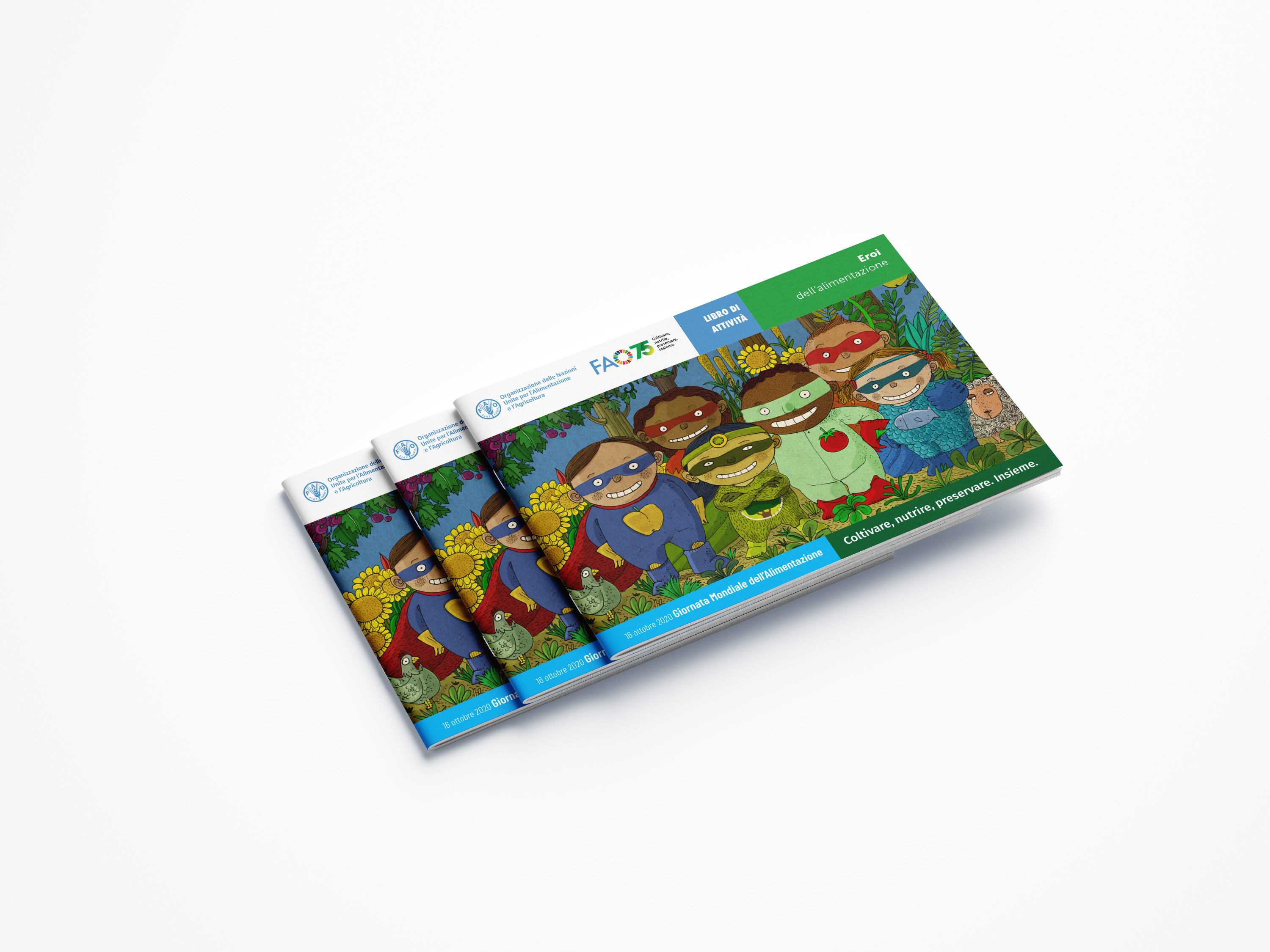
Libro in altre lingue
Arabo
Cinese
Francese
Inglese
Spagnolo
Russo
Portoghese
Libro di attività - Lavoriamo per Fame Zero - Libro di Attività sulla Giornata Mondiale dell’Alimentazione 2018
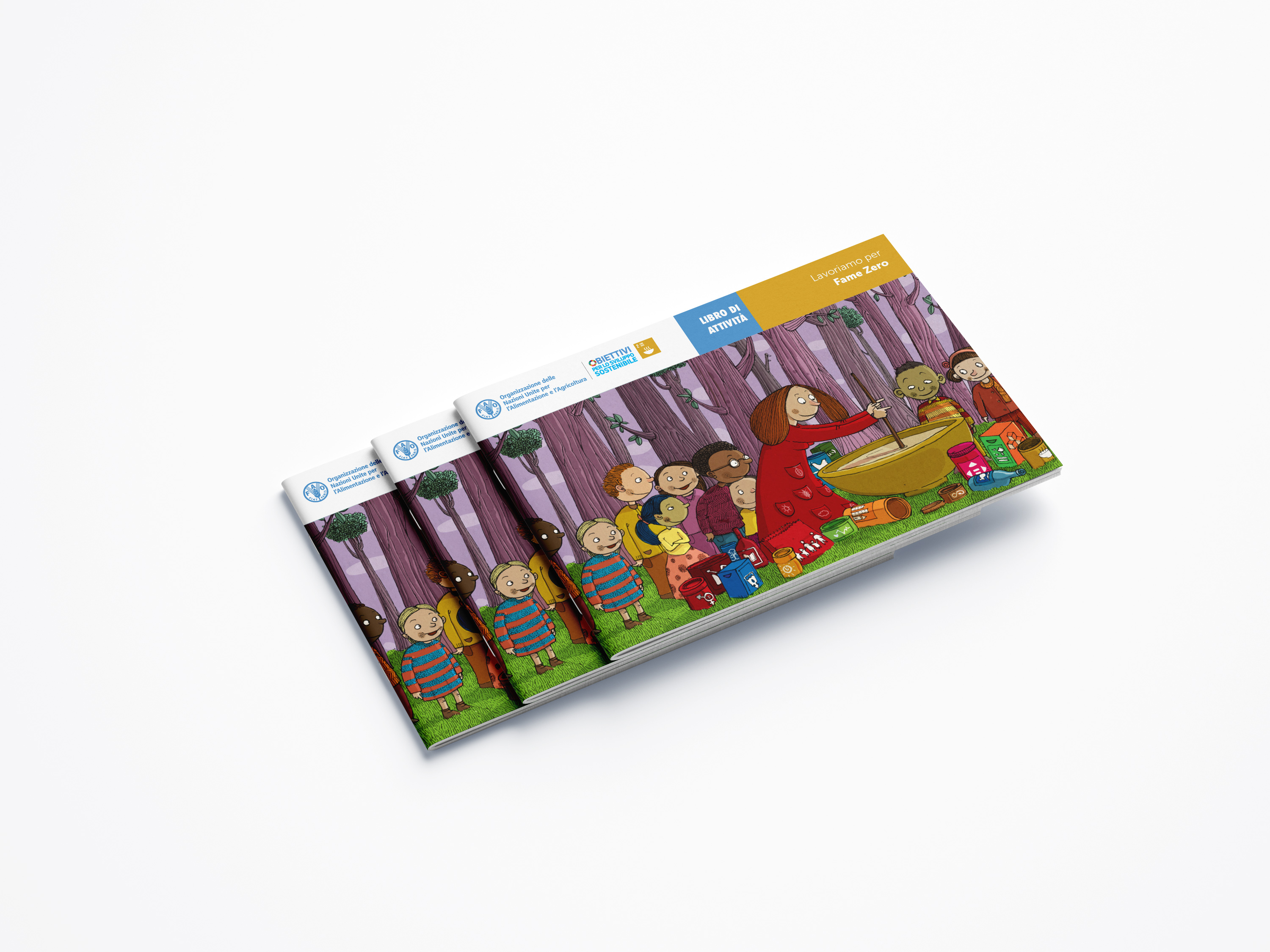
Libro in altre lingue
Arabo
Cinese
Francese
Inglese
Spagnolo
Russo
Libro di attività - Il clima sta cambiando. L’alimentazione e l’agricoltura anche
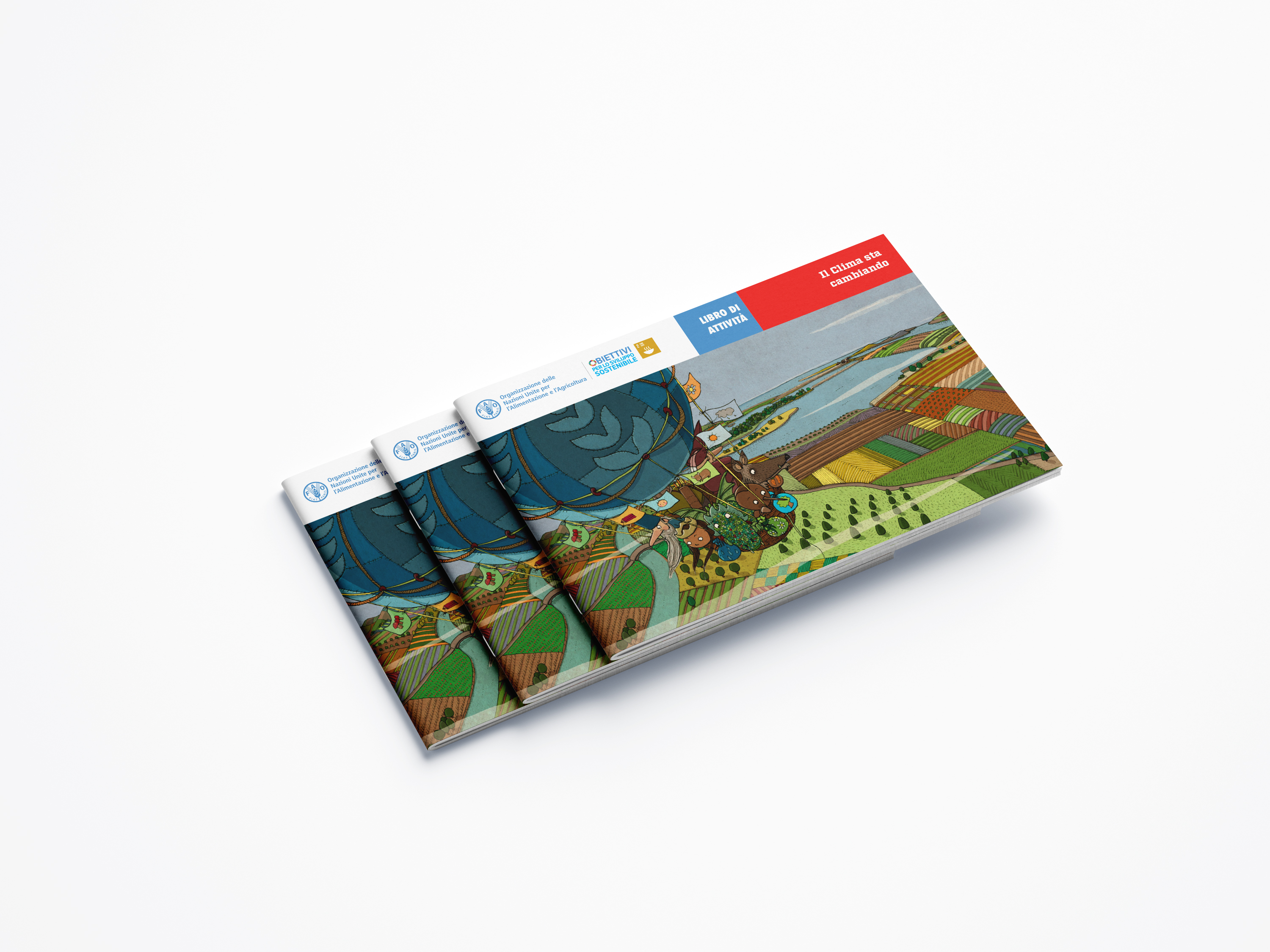
Libro in altre lingue
Arabo
Cinese
Francese
Inglese
Spagnolo
Russo
Libro di attività - Cambiamo il futuro delle migrazioni
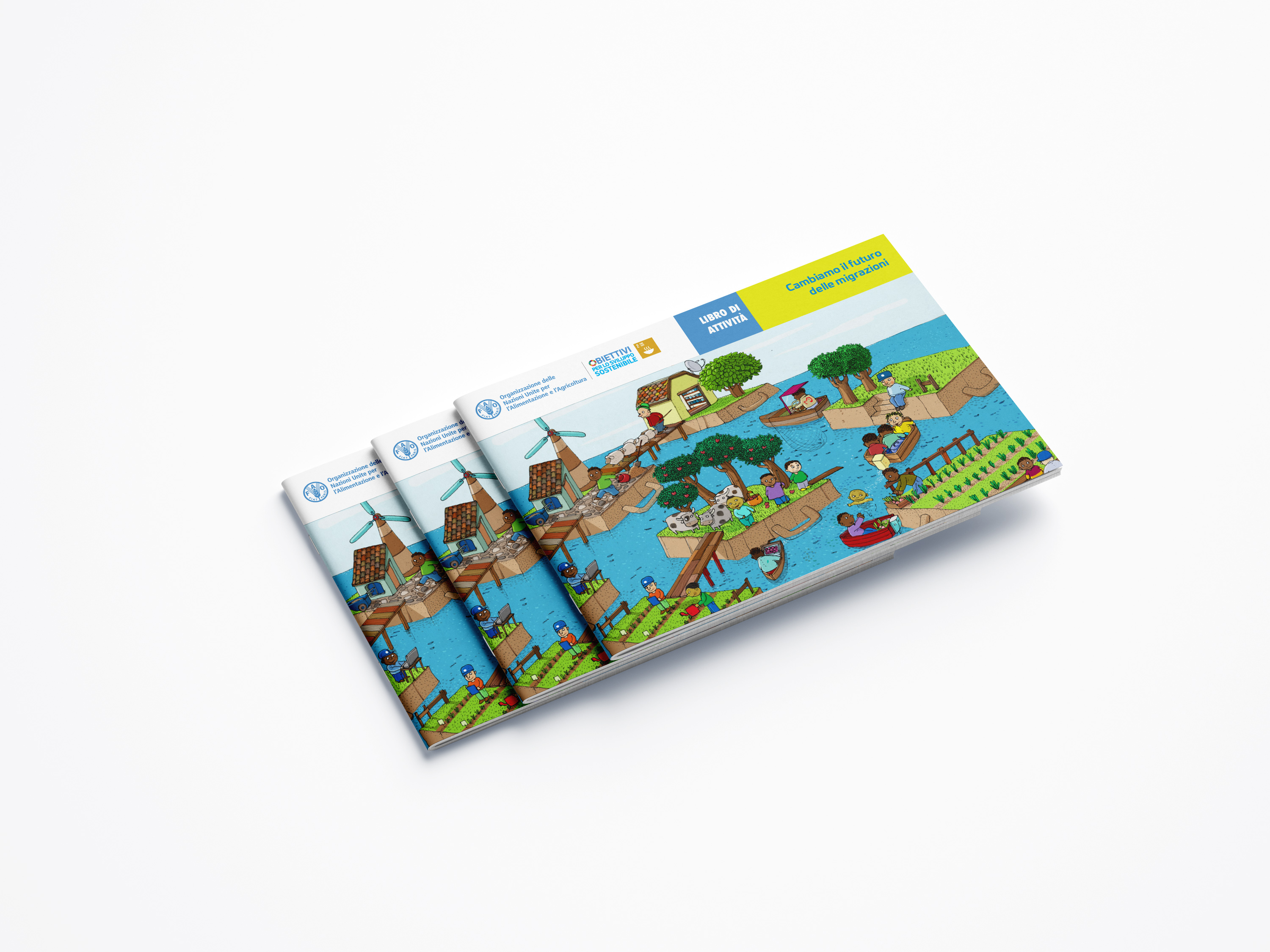
Libro in altre lingue
Arabo
Cinese
Francese
Inglese
Spagnolo
Russo
Libro di attività - Piante sane per un paese sano

Libro in altre lingue
Arabo
Cinese
Francese
Inglese
Spagnolo
Russo
Libro di attività - La tua guida alla FAO
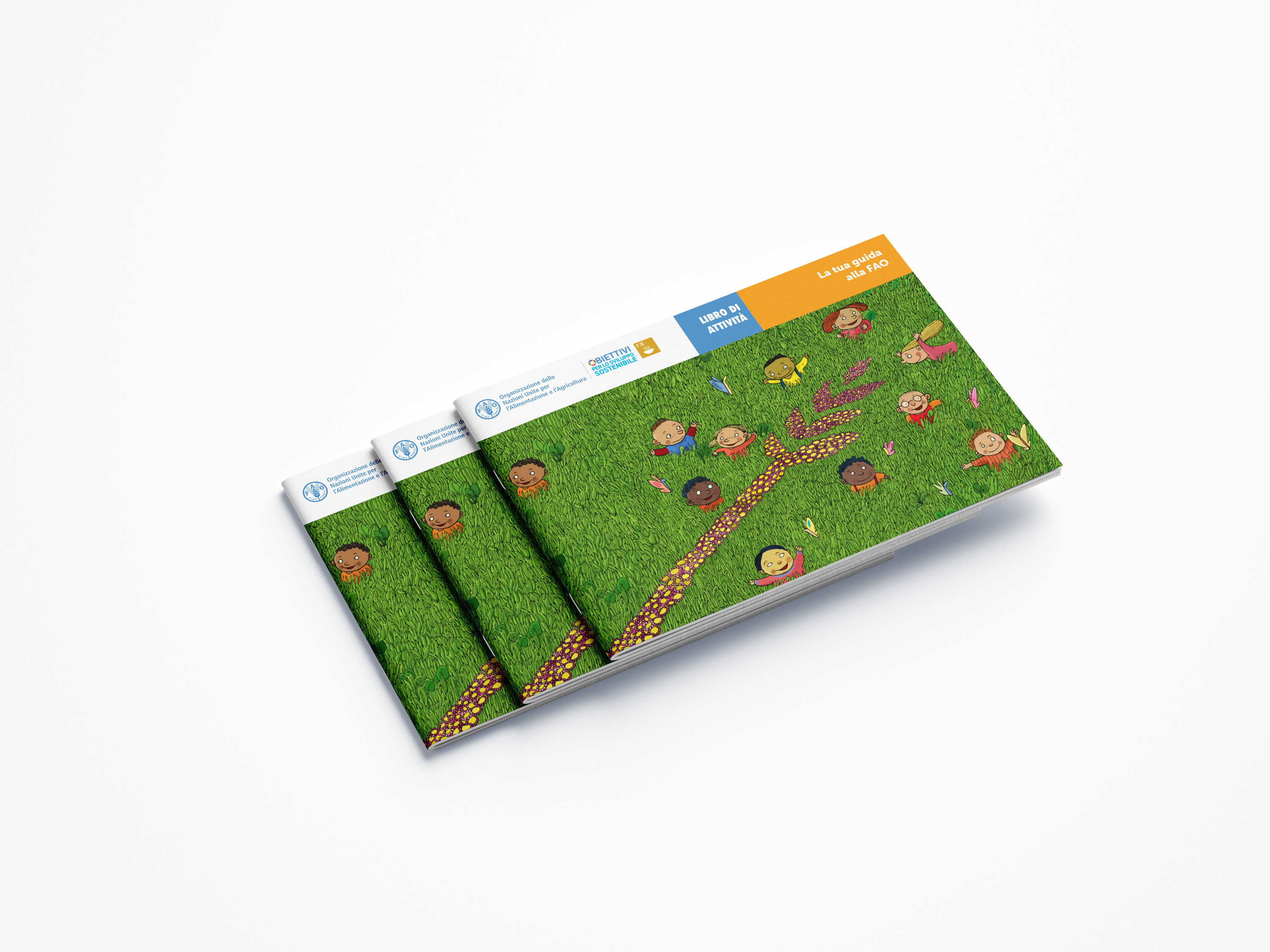
Libro in altre lingue
Arabo
Cinese
Francese
Inglese
Spagnolo
Russo
IFAD
- Handbook for Scaling Irrigation Systems
Handbook for Scaling Irrigation Systems is a joint publication between IFAD and IFC on how to develop and scale innovative solutions to improve the livelihoods of smallholder farmers and increase crop productivity. - Research Series 81: Food and water systems in semi-arid regions – case study: Egypt
This paper explores the role of water in Egypt’s food system and the dilemma the country faces: raise food self-sufficiency by allocating freshwater resources from the Nile to food production, or rely on food imports from water-abundant regions worldwide. - Water harvesting systems for smallholder producers, tips for selection and design
This brief raises awareness about water harvesting systems and describes the design of water harvesting interventions. It aims to inform stakeholders on the assessment of water demand, water available for harvesting, and the selection of suitable water harvesting systems. - Research Series Issue 66: Can perceptions of reduction in physical water availability affect irrigation behaviour? Evidence from Jordan
We investigate how perceptions of physical water availability in the past are related to farmers’ current irrigation behaviour. - The Water Advantage: Seeking sustainable solutions for water stress
Among ecosystems services, freshwater is one of the most fundamental for life. For smallholders, water means the difference between a decent life and poverty, hunger and malnutrition. - The Marine Advantage: Empowering coastal communities, safeguarding marine ecosystems
Agriculture and fisheries, the backbone of food security and nutrition for coastal communities and globally, are under threat. - The Drylands Advantage: Protecting the environment, empowering people
Present in each continent and covering over 40 per cent of the earth, drylands generally refer to arid, semi-arid and dry sub-humid areas, and are home to more than 2 billion people.
IFAD Filmati
- Sudan: Water Wars
The world is now very familiar with images of fighting in Ukraine, but it is not the only place in the world experiencing conflict. In Sudan, frequent fighting between farmers and herders over water and grazing land is causing injuries and even death.
As climate change gets worse, access to water sources – particularly groundwater - will become more and more critical. In Sudan, one of the world’s most climate stressed countries, access to water and conflict resolution centres are making an enormous difference in addressing the water wars. - Guatemala: Bringing Water to the Well Italiano | English
In areas of Guatemala which are chronically affected by droughts, IFAD-supported irrigation schemes and practices make farmland four times more productive. - Food and Water issues and solutions
Food would not exist without one essential ingredient. Water. It plays a major role in all aspects of food systems, yet around 2 billion people around the world live in areas of water stress and do not have reliable access to it. Many small scale farmers in the developing world depend on rainfall to water their crops, yet due to climate change its no longer predictable. IFAD is working alongside these farmers to offering long term solutions to help them produce food for themselves and for us all. - Ethiopia: Water works
Water is a vital ingredient to growing many crops around the globe, but while the world has enough water, it’s often not in the right places, at the right time. Ethiopia has long been associated with droughts and famines, but climate change has made the droughts even longer and more devastating for small scale rural farmers. Molach lives and farms in Tigray. She used to be unable to farm for many months of the year, as a result she could not grow crops to sell or eat and could not feed her family. Now her life has been transformed by major investment from IFAD supporting the Ethiopian government in a large scale irrigation and dam project. - Niger: No Safety Without Water
Increasing violence in the Sahel region is causing a rise in the number of internally displaced persons. Fleeing Boko Haram through the desert, there is an urgent need for shelter and basic resources, like water. - Jordan: Troubled Waters
An IFAD-supported project in the south of Jordan helps poor farmers better manage soil and water resources in one of the world's top ten water-poor countries. - Tanzania: The Long Walk for Water
The land is dry around Katikati village in northern Tanzania and water is scarce. The Maasai here travel up to 100 kilometres a day searching for water and it's a dangerous journey. But now they know that there is water - 180 meters under their feet. After drilling a borehole here, the Maasai can access clean water and they've started to settle, building a school and more permanent houses. But how will this affect the land and their culture? - Water is life - An interview with Rosa de Jesus in Northern Brazil
It was Rosa de Jesus' smile -- an ever-ascending crescent of hope and gratitude -- that sealed the deal. Yes, the work of the International Fund for Agricultural Development (IFAD) in Brazil's poor and disenfranchised North-East state of Bahia was having a positive impact. After all, Rosa didn't have direct access to drinking water until we co-financed a project that built a rooftop water collection system on her well-kept cinder-block bungalow. And in an area that receives between 500 and 800mm of rain a year, water is life. No wonder Rosa was smiling. - Brazil: Grey Water, Green Ground
In the North East of Brazil, millions of people battle to grow food around their houses due to toxic grey water from washing and sewage that runs outside. But now a newly designed biowater filtering system has the potential to change all of their lives. The dirty water passes through a filtering system. The filtered water is then clean enough to use to irrigate the land. This is the story of Ulisses dos Santos who has tested out the system for one year. Now he is not only eating better, but also making a profit. - Fostering ecosystem services in the Peruvian Andes
The FIDA-MERESE project has helped farmers in the Jequetepeque and Cañete river basins become stewards of the ecosystems on which they depend.
WFP
BIOVERSITY International
- 2017 - Featuring water harvesting and climate smart agriculture.
- 2022 – Link between drought, beans production and human diet - What we know and where to go
- 2022 - Featuring soil and water conservation for climate resilient agriculture.
- 2022 – In terms of implementation, here is a project led by the Alliance in Kenya, addressing water retention